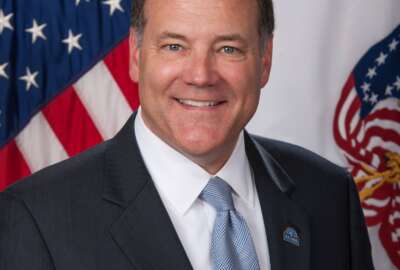
Wilkie resumes direct ownership over some VA personnel moves, at least for now
Veterans Affairs Secretary Robert Wilkie says he'll review some personnel moves and major agency actions himself, as 16 senators urge the new secretary to review a...
Amid reports of outside influence on the department’s policy decisions, Veterans Affairs Secretary Robert Wilkie is taking back a small bit of ownership over some personnel moves within the agency.
The new secretary has decided final approval of the agency’s major notices and guidance, as well as all promotions, disciplinary actions and relocations for some members of the Senior Executive Service, will rest with him, not the chief of staff.
Wilkie announced the decision in a memo, dated Aug. 3, which rescinds previously-delegated authorities that had gone to the chief of staff:
- Delegation of authority to review and sign an agency report to the Office of Special Counsel
- Delegation of authority to make determinations on ‘no action’ recommendations regarding SES and Title 38 SES-equivalent employees
- Delegation of authority for disciplinary actions relating to intentional discrimination and retaliation
- Delegation of authority to sign on behalf of the secretary
- Delegation of authority to approve all permanent change of station/relocation actions
- Delegation of authority for rule making, notices and significant guidance documents.
The VA chief of staff had received this authority to perform these activities on behalf of the secretary starting back in 2009 and as recently as February 2018, according to Wilkie’s new memo.
These are relatively common authorities to delegate to someone else, leaving a cabinet secretary more time to focus on high-level, strategic activities.
But the move signals Wilkie is attempting to re-centralize his authority and take back ownership of personnel decisions at the department, some of which have earned criticism and concern from lawmakers in recent months before his arrival.
The decision to take on these responsibilities for himself will likely create significantly more effort and paperwork for Wilkie — at least in the interim.
“Secretary Wilkie has decided to rescind those delegations before determining what decision-making authorities he may choose to delegate,” VA spokesman Curt Cashour said in response to questions about the memo. “We expect several authorities will be re-delegated after review.”
Wilkie’s decision comes as 16 Democrats, including Senate VA Committee Ranking Member Jon Tester (D-Mont.) and Sens. Tim Kaine (D-Va.) and Mark Warner (D-Va.), urged Wilkie to right the ship and review personnel actions that acting leadership took prior to his arrival as permanent secretary.
Lawmakers said they were concerned about the impact such personnel moves had on long-time career employees and senior leaders.
“You will need to right the ship at VA by reassuring the non-partisan career employees that their institutional knowledge and dedication is valued,” the senators wrote in an Aug. 9 letter to Wilkie.
The department’s implementation of the president’s executive order on official time, for example, warrants Wilkie’s attention, the senators said.
VA on July 17 issued guidance to the agency’s labor relations specialists and union representatives about its plans for implementing the new limits on official time as described in the president’s May 25 executive order. The guidance directed union representatives to begin making plans to limit official time to no more than 25 percent of their work hours.
“Acting leadership of the department did not set you up for success in your relationships with employees by rushing the execution of the recent executive orders,” the senators wrote. “According to briefings from VA staff, many aspects of these orders were carried out based on guidance from the acting secretary and the front office. And putting hundreds of VA employees into questionable status prior to your arrival is not operating in good faith.”
The American Federation of Government Employees, which represents more than 260,000 VA employees, has filed a grievance with the department over what it called a “chaotic” implementation of the EO.
Lawmakers suggested acting VA leadership could have made preliminary preparations to implement the executive orders but should have waited for Wilkie’s approval.
They’re also concerned about the selection of key senior leadership, particularly at the Veterans Health Administration, which still lacks a permanent, commission-appointed leader. Carolyn Clancy, a career executive who had led VHA on an acting basis, was recently reassigned and now serves as VA’s deputy undersecretary for discovery, education and affiliate networks. Acting VA Secretary Peter O’Rourke appointed Richard Stone to lead VHA on interim basis in mid-July.
“We believe this individual, while possibly very qualified, was brought on board without your input,” the senators wrote. “In doing so, VA displaced a long-time career employee who had been serving as executive in charge and who had the faith and confidence of VHA employees.”
Wilkie announced a series of leadership changes earlier this week, the first of his tenure as permanent VA secretary.
He appointed Pamela Powers to be VA’s new chief of staff. Powers served as Wilke’s chief of staff in DoD’s personnel and readiness office and has more than 30 years of experience in the Air Force and Pentagon, according to her VA biography.
Jacquelyn Hayes-Byrd, who previously served as O’Rourke’s acting chief of staff, will temporarily lead VA’s Office of Human Resources and Administration. Hayes-Byrd has public and private sector experience. She’s held positions in state and federal government and rose to the rank of major in the Air Force, where she served as an education and training officer.
Hayes-Byrd fills the assistant secretary for human resources and administration position left open by Peter Shelby, who left VA earlier this summer to pursue opportunities in the private sector, the agency said.
Copyright © 2025 Federal News Network. All rights reserved. This website is not intended for users located within the European Economic Area.
Nicole Ogrysko is a reporter for Federal News Network focusing on the federal workforce and federal pay and benefits.
Follow @nogryskoWFED
Related Stories





